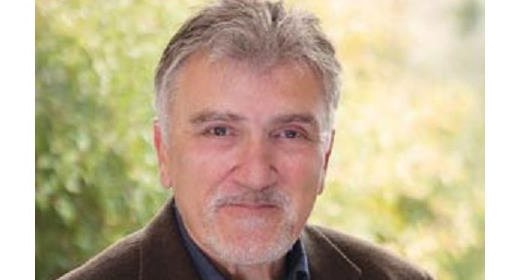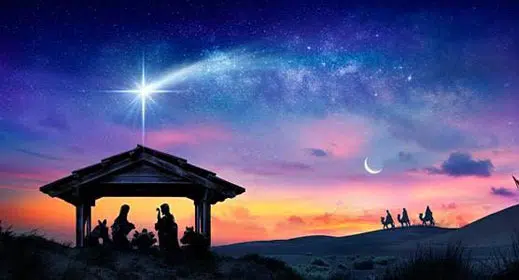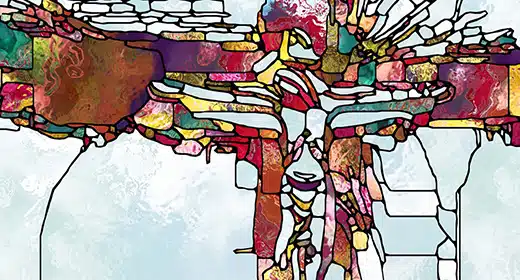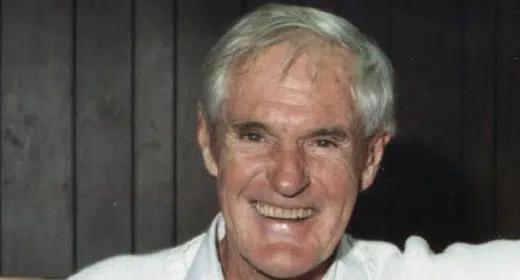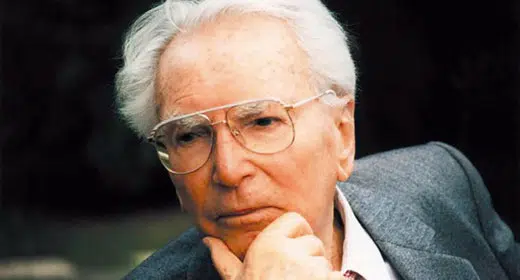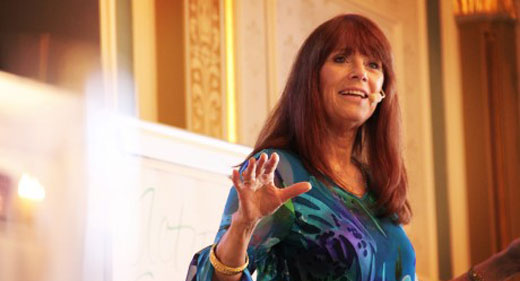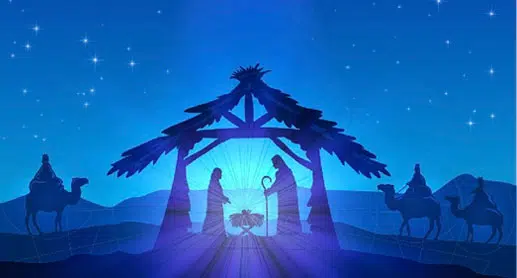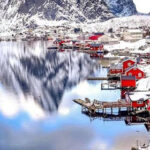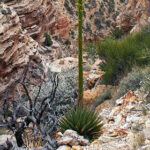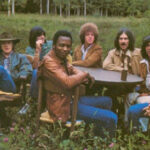by Brian Creigh: This month, we conclude our interview with Mooji (Anthony Paul Moo-Young),  a disciple of the great Advaita Master Sri H.W.L. Poonja, or Papaji, as his followers call him. This is the second of a two-part interview with Mooji by Brian Creigh, the publisher and executive editor of Veritas.
a disciple of the great Advaita Master Sri H.W.L. Poonja, or Papaji, as his followers call him. This is the second of a two-part interview with Mooji by Brian Creigh, the publisher and executive editor of Veritas.
Born in Jamaica, Mooji lived in London for over forty years. In 1987, a chance meeting with a Christian mystic was a life-changing encounter for Mooji. It brought him, through prayer, into the direct experience of the Divine within. In a short period, he experienced a radical shift in consciousness so profound that outwardly he seemed to many who knew him to be an entirely different person. As his spiritual consciousness awakened, a deep inner transformation began, which unfolded in the form of many miraculous experiences and mystical insights.
Intrigued by this major shift in perception and wanting to merge fully in Truth, Mooji discovered the teachings of Sri Ramakrishna. This connection
prompted Mooji to travel to India where he was to meet his living Master, Papaji. There, at Papaji’s feet, whatever still remained of a functioning ego was finally
uprooted.
Recognising Mooji’s radiance, people from various parts of the world began to approach him in search of the direct experience of Truth. The capacity to guide them arose spontaneously in him. Although Mooji’s presence carries a devotional fragrance, the words that spring from his being are of the nature of non-duality. His guidance evokes the love for, and the direct recognition of, the timeless Self we are.
Mooji dedicates his life to the calling of the Heart. It is this which has given rise to Monte Sahaja, an ashram and retreat centre being built in the south of Portugal. Mooji is the author of Before I Am: The Direct Recognition of Truth; Breath of the Absolute: The Manifest and Unmanifest are One; and Writing on Water: Spontaneous Utterances,Insights and Drawings.
BRIAN:What is satsang?
MOOJI:Satsang literally means to associate with the highest truth. Really, it means to be in an environment where truth is honoured, and becomes the climate of thinking, feeling, acting, and being. A common expression of satsang is that people gather around a being who has recognised, understood, and transcended the egoic limitation, and has discovered the truth of what we are–not just what he or she is personally, but what the whole game is, internally. When one has understood this,then those who are searching for the direct experience of truth feel the attraction to gather around such a being, and questions and doubts are posed and responded to. Through the energy field of such an environment, somehow the mind slowly drops into that inner space–not of assumption and projections–but of direct experience and recognition of what we are searching for, you see? The discovery of truth is not something you buy over the counter.
There has to be a level of commitment or at least an urge, a seriousness or authenticity in the searching. This is satsang.
BRIAN: How important is satsang to a person’s spiritual growth?
MOOJI: Very, very important. In that type of very supportive energetic field, you are among other beings who are called by the same voice, you can say. And to
be in such an environment, where the level of consciousness is quite subtle and becoming more pure, is very, very inspiring also. It creates a sense of normality with truth so it is not seen as some far-off thing, but is experienced and lived in its natural power. Sat-sang is not merely a learning or teaching space where you come just to think or share ideas, but more a space where you’re discovering, recognizing and confirming truth directly–it’s a living, breathing knowledge. It is more the atmosphere of intuitive knowingness, rather than informational knowledge; an intuitive vibration is there, you see? So sat-sang is very important, and in fact I would go as far as saying all the beings in existence are in sat-sang to some A common expression of sat-sang is that people gather around a being who has recognized, understood, and transcended the limitation, and has discovered the truth of what we are–not just what he or she is personally, but what the whole game is, internally. We’re in a journey to discover our
original being.
BRIAN:Is satsang a sense of authenticity?
MOOJI: Yes, the environment of sat-sang is so authentic that it allows space for the inauthentic to be expressed and seen. If you are in an inauthentic environment, you only project, imagine, and even pretend. You will not experience fulfillment. Quite likely, you just stay in a sense of confusion. But when you’re in an authentic space, a true space where there’s love and openness, then what is hidden comes to the surface of consciousness, pops, and then disappears.
BRIAN: With all the sat-sangs that you have led over the years, what have people struggled with the most, and how can they overcome this?
MOOJI:I would say, at the root of all struggle is identity. All struggle is identity; that we are living with a notion of ourselves that is not true. That is the chief cause of suffering, confusion, frustration, and aggression. We are suffering from a kind of delusion; it’s almost like a fever of misunderstanding. I may even call it a spell. I’ve been saying recently that perhaps the great disease of mankind today is a sense of lacking inner space, which is caused by an absence of awareness of who we really are. How can we overcome this? It’s not difficult, actually. We must become open to truth again. Most people have a natural sense that ‘my life, as it is, is not really enough, it’s not the real deal, there is something missing.’ People are open to truth if you demonstrate truth through your own presence, rather than merely preaching at them. We have a wisdom inside us that knows, ‘come on, life cannot just be about career, marriage, and having children.’
First, it’s important for people to know that in the core of themselves is something beautiful, perfect, harmonious, and whole. The truth is already intact as an untouched space, a dimension within ourselves–our essential nature–that is ever pure, perfect, and free. It’s never been soiled. Even just hearing this should bring hope again to people’s minds: “My God, there’s something inside that is unstained by life.” Many may already have that sense anyway, but still they may ask, “Well, how can I access that again?” And then there are those who are doubting: “Is there really something that pure in me?” In satsang we look at why the truth feels so distant from ourselves.
It’s not that they’ve got to go out and create this truth, but more that they must discover this by peeling away the layers that seem to hide this natural
recognition. So that, in my view, is a good starting point. And then, not leaving it merely at the level of words, thoughts, or feelings, but also using simple exercises to guide the attention inward, which will introduce the energy and presence of truth within.
BRIAN: We tend to identify with the human conditions of suffering, pain, fear, et cetera, at a very young age. What can parents do to help their children recognise their innate spiritual nature early on in their life?
MOOJI: The parents themselves must first awaken, otherwise they are only passing on second-hand knowledge as has been passed to them. You cannot guide a child into true spiritual discovery if you are lacking that in yourself. So the parents must also, maybe along with the child, be in a supportive environment that helps them to come into that organic understanding together. Like this, the child may advance more quickly than the parents because it has less baggage. If truth is presented in a way that is simple, natural, and clear, children grasp this very easily. Even if they don’t understand the words, they certainly respond to the atmosphere and vibration of satsang. Often, they are much quicker to grasp the essential point than adults.
So, to answer your question, parents themselves must be at least strongly attracted to the search for truth and be making positive and profound discoveries in themselves. When the truth is swallowed and is no more merely conceptual, but a living reality, the emanation of their own sweet vibration is inevitably felt by their children–they are actually already absorbing this atmosphere.
BRIAN: One of the things that we get asked a lot is: In a materialistic world, how can we have possessions without becoming possessive?
MOOJI: The things in themselves are just what they are and there’s an innocence and naturalness in that. You can include, for instance, money, your car, your
Some are happy with a lot, some are happy with little. The important thing is what they mean for you. If having more things means, ‘I’m a better person, I’m greater, I’m more important,’ then you’re in a trap. If possessions are part of the natural enjoyment of life and you can easily step aside from them if the need arises, then they won’t disturb your
equanimity.
BRIAN: Many go through life having no religious or spiritual beliefs. They simply live for the day. As spiritual beings can we learn anything from this state of being?
MOOJI:If people live a day-to-day, handto-mouth existence and have no spiritual or religious background, that by itself is not a problem, in fact. Very often, people coming from a non-spiritual background demonstrate a kind of earnestness, an openness that is really refreshing, and they come quickly into the seeing, which is innate in all beings. They discover the truth in a fresh way without the baggage of spiritual or religious conditioning. When we refer to truth, we are not preaching a religion, we are not even honouring the term spirituality. It’s only a tool and window of recognition.
What can we learn from people if they are simply living from day-to-day, going to work, earning their wages, doing their regular thing? Well, we can learn that this is not enough to fulfill one’s heart. It’s okay if we just want to exist without really being challenged by life. We can, for a while, go on like that–have a beer each day, watch a movie, go and see friends, and so on. But it is not enough, in the sense that we are such a wealth of potential and possibilities. It is a kind of blindness when we don’t discover that we are infinitely more than a machine for earning money, eating, having fun, and finally, falling asleep to wake the next day and start all over again. I mean, we are and have such a power–a beautiful power that is vaster than just serving our little idea of ourselves and our little lives. There’s something so huge, so broad, so infinite here–simply awaiting recognition.
People are open to truth if you demonstrate truth through your own presence, rather than merely preaching at them. When we refer to truth, we are not preaching a religion, we are not even honouring the term spirituality. It’s only a tool and window of recognition.
The purpose of our existence is to discover that we are what we have been seeking all along–the everlasting Self. And yes, it is possible, totally possible in this lifetime. You can have the whole world and not be possessed by it. This is the secret. If you say, “Oh, these are my possessions,” but are not possessed by them, it’s fine, actually. It’s the attachments rather than the objects themselves which become the problem. As soon as we start to possess, we are compelled to protect and guard our possessions and our attachments to them, also. As you look from a deeper place inside, the way you see and regard the term ‘possessions’ may very likely change. It will not have such a heavy weight. I don’t see a problem with the material things in themselves, I don’t see any problem with it at all. It’s just what they come to represent for us that makes them a much bigger thing than they really are. You may lose your possessions, but your possessions have
not lost you. They don’t have any concept that they belong to you. It is you who have an idea ‘these things belong to me.’ It becomes like a kind of imprisonment to a certain extent. As you come more into your conscious freedom, then there’s an innocence seen in the human things. Some people have a lot, some a little.
If we look at figures such as the Buddha without the religious paraphernalia, we see one human being who has discovered the simple truth of who he is, and who has become one with that recognition. And just from that discovery and the words he spoke, millions of human beings have been touched, their lives shaped and transformed from listening and following the pointing he imparted. That is the power dwelling within each being. So, I would say that if we are merely living a day-to-day existence, unconsciously–and I’m not saying that it’s a choice you make; consciousness also is expressing like this for a time–then somehow, gradually our life deepens and maybe a search for something more profound sprouts inside, and a mundane journey blossoms into a fresh possibility.
BRIAN:Does meditation play a role in this?
MOOJI: Yes, but first try and clarify, come to an understanding of where the mistake has been, why are we living with this idea that the truth is a long journey and only for some rare beings? Blow the myth open and see that actually, it is already here, first experienced as the sense of presence inside ourselves, and beyond this–the immutable Being. When that is understood and experienced directly, meditation serves to confirm the understanding, not merely intellectually, but to assimilate it totally and remove the sense of separation between ‘you’, the meditator, and pure meditation itself.
Meditation starts as an action taken and ends in inaction. At first we feel that we must try and practice meditation with an aim of reaching the place where we are again in harmony. Our natural state is what I would call natural meditation, but our culture has put our attention on becoming something other than the truth we already are.
BRIAN:So how can we form an unwavering connection with our higher consciousness? In other words, how can we keep that connection strong throughout each and every day?
MOOJI:I have to say, this thing about a connection itself is not really a truth. You are that. This is the emphasis, and it is something that is repeated over and over and over again. The reflex is to go back to the idea ‘we are not that.’ First, you are here as the sense ‘I am,’ ‘I exist.’ Then, with this body comes certain conditioning: ‘I am this body, I am this person, I am John.’ Certain culturing was embraced and accepted as ‘this is who and what I am,’ but all this conditioning is subsequent and secondary to your Self. If you are searching for truth, it must enter the consciousness that you are already that, but presently you are not aware of it. The minds of people tend to imagine that truth is something far away and is just for some rare beings. The thought comes, “I’ll never be a Buddha.” We have a lot of cultural myths about spirituality, whereas in truth, it is much more accessible, it’s much simpler than our mind’s portrayal.
First, there must be some kind of urge. It might seem to start as an accident or as a curiosity. It can start in so many ways. But, somehow, when the attention turns away from the addiction to the external, something spontaneously begins to question inwardly. A gentle curiosity turns into a kind of urge, and when the urge becomes deeper, it becomes an urgency, and urgency ultimately becomes an emergency–“I have to find this.” After emergency, some great discovery has to happen. All true emergencies are followed by profound change.
We are already in the game, you can say, of self-discovery. It is just that some things need to be pointed out to the sincere seeker, with a degree of wisdom and sensitivity so that the mind comes back on track. If ego, resistance, judgment, and fear are present but there is no dedication to them, they will gradually wither away under the laser light of true inquiry. It won’t happen in one go, but gradually some misunderstandings are recognised and swept aside–a kind of cleaning out of all that is untrue takes place. Each misunderstanding that is exposed as untrue, and is discarded, is replaced with peace, a sense of expansion and a joy.
One comes to recognise: Wait a minute, but that is not something that has to be maintained or forced, it is always effortlessly here. What seems to have created the misunderstanding is the identification of the being with the arising ‘I’ concept, resulting in the mutation called ego. This is the psychological mind.
One realises: I’ve been living with this idea of myself which is not true. And now I see that all this has been imagined inside my own self. It’s not that I’ve got to go somewhere else for the truth. The truth has always been here, but it seemed to be eclipsed by a fascination for what is not true. Knowing this, I am free.
BRIAN: Beautiful. What would you say is humanity’s ultimate destiny?
MOOJI: Every human being must wake up, whether it is in one lifetime or many. This is the ultimate. As far as I can push it, I will say, that ultimately each one will come to the truth. It has to happen. Better sooner than later. But, it may also take many lifetimes to come to that ultimate seeing. I am using these words. I’m taking a risk to speak like this, okay? The way things are looking at the moment, from a spiritual perspective we’re in a recession to some extent. I feel that a recession is good; it precedes and is a part of the coming-out breath of existence. The whole human experience is a sort of flow, rhythms and waves of movement. Sometimes we have to go down a little bit and reach a lower place in ourselves to then begin reevaluating and valuing again what we have and who we are. And we are in a bit of a depression at the moment.
Consciousness expressing as life plays like this, in rhythms and contrasts. So what is the destiny? It is not just one single thing. Whatever the apparent destiny might be at any one time, it can always change. This is a mystery. It doesn’t take such a great effort to change, because if one human being’s life can turn in such a quick way, actually a lot of people’s lives can change just as quickly. And with the change that happens internally and the emanation that flows out of that change, things can and must pick up. They have to pick up. But in response to your question, I take the liberty to say, in the long run everyone will wake up. However, not all the fruits on a tree come to ripen at the same time, but the tree lives on.
BRIAN: So just on a final note, what is the ultimate truth?
MOOJI: The ultimate truth is that we are that in which all this universe emerges and is perceived. We are the eyes and mind that watch and also, beyond this, as that which watches the eyes watching. We are the totality in expression as individuality. We are pure consciousness. We are whole and harmonious in our innermost nature. If we have the idea that we are only our body-minds, then what I’m saying now may not feel true. It may seem very far away from the life you are accustomed to. But you asked me this question and I answer for myself, the ultimate truth is that we are this timeless and perfect harmony. We are timeless. We are timeless, we are whole, beyond the concept of timelessness and wholeness. We are that perfect reality in a journey of experiencing through these forms, to have a taste of our infinite origin even while we are dressed in these frail bodies. To discover the Supreme Being and our innate harmony and synchronicity with it while the body is still warm is the opportunity we have. And coming back to a question you asked me earlier: The purpose of our existence is to discover that we are what we have been seeking all along–the everlasting Self. And yes, it is possible, totally possible in this lifetime.
BRIAN: I couldn’t have thought of a better way to end our interview together, Mooji. It’s been a real pleasure and a real honour for me to have you here.
MOOJI: Thank you so much. You have presented some very good questions which are very welcome, because they give the opportunity to probe more deeply and look at things that are a kind of obviousness which we overlook to our peril. Let’s rise to this auspicious challenge together.
BRIAN: I really appreciate your time today, Mooji. Thank you very much for being here. Namaste.
MOOJI:Namaste. Thank you so much.

